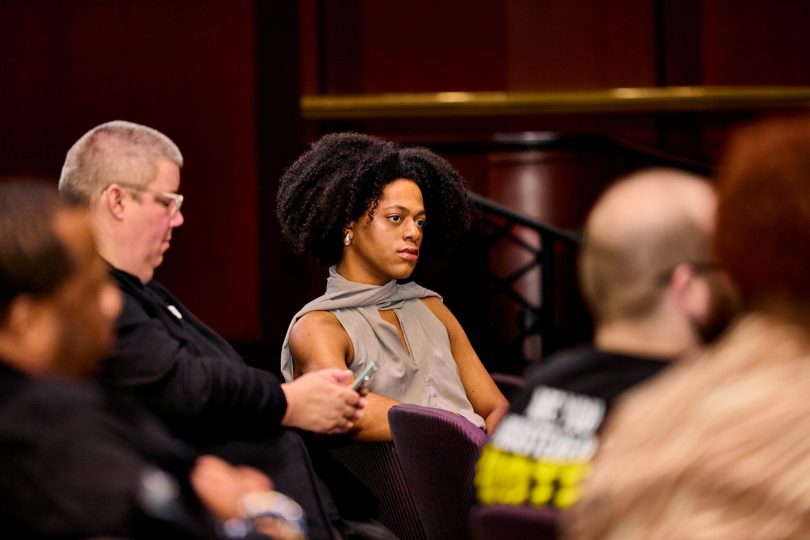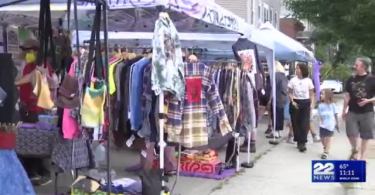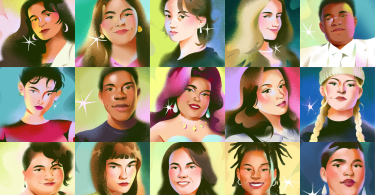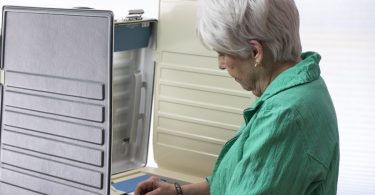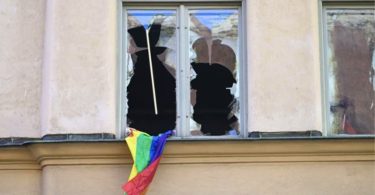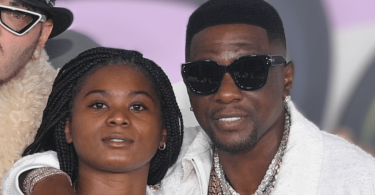When asked if the tech industry is “too big for their britches” Tiana Tukes said emphatically, “No.”
Tukes is an Atlanta-based entrepreneur, academic, and humanitarian. She is known as the co-chief executive officer and founder of LGBT VC (venture capital), a global nonprofit created with the goal of advocating for financial independence and closing the Black LGBTQ wealth gap. Additionally, she is the self-described as the “first ever Black trans woman to be a lecturer in entrepreneurial management within the economics department at Spelman College.”
The lecturer sat for an on-the-record interview with GLAAD after the GLAAD Media Institute – the organizations research, education, and training leg – hosted a two-day media advocacy training in Atlanta where LGBTQ artists, tech and business moguls, politicians and activists shared space to learn how to best tell their own stories to their audiences from social media, print, digital news and otherwise.
Tiana Tukes joins others in a media presentation discussion with the GLAAD Media Institute; photo by JElijah
During interviews, and in between participating in one of the three of the GLAAD Media Institute’s media presentations, Tukes was adamant about focusing on how artificial intelligence (AI) is and will harm the LGBTQ community the way social media algorithms already are.
AI is one of the fastest growing components of tech – which is algorithmic – affecting LGBTQ people. AI is technology that allows computers and machines to simulate human intelligence and problem-solving capabilities. This is important because algorithms feeding information to social media already enable disproportionate violence against the LGBTQ community. Without intervention, this harm only grows in AI spaces.
“Algorithms written right now – in the AI space – they don’t include the trans mindset, the trans person, the trans humanity. When you think about the way AI is used and the way it will be used in the next 10-20 years, people are using AI in multiple ways for research studies. That research will be used and backed against policy that will affect our lives,” Tukes in an interview with GLAAD.
The trans “mindset” Tukes speaks to is lost on most Americans. This shows in GLAAD’s 2023 Accelerating Acceptance report. According to the report, 71% of Americans claim they’ve never met someone who is transgender. This is alarming especially as anti-transgender rhetoric from politicians and some in the media continues to rise.
Algorithms, for instance, are the language of social media platforms. And in large part, they fail to properly represent the vast LGBTQ community. In GLAAD’s most recent finding of the 2024 Social Media Safety Index, research found that “Platforms are largely failing to mitigate this dangerous hate and disinformation and inadequately enforce their own policies. Also, platforms disproportionately suppress LGBTQ content, including via removal, demonetization, and shadowbanning.”
While platforms are showing improvement, they are still largely failing the LGBTQ community. For example, TikTok was graded 67%, which is a 10-point increase from last year. However, “the company’s policies fail to adequately protect LGBTQ users in other key areas,” reads the report.
View this post on Instagram
The facts show that there is a direct relationship between online harms, real world harms, and the hundreds of anti-LGBTQ legislative attacks rising each year. Like Tukes, activists and artists are fighting back to correct LGBTQ representation through their artforms and social media presence.
Like Tukes, Charlie Xile believes that LGBTQ people need to be in every space. He aims to accomplish this goal through music, art and education. With that, Charlie chose his last name, “Xile” like the word “exile” to remember his mission to expel closed minds and assist in opening them.
“I want to encourage, help people who may be stuck in a vision or thought process that they can’t understand,” Xile said to GLAAD in an interview. “The biggest thing that people don’t understand in our community is trans people.”
Charlie Xile sits down to interview with the GLAAD Media institute; photo by Lana Leonard
For Charlie, this understanding is what helps invest in trans inclusion in spaces like music, and tech which often exclude trans people at the administrative and executive levels.
“People hate that people are open minded just because they’re closed minded,” said Xile. His message to youth is “stand in your power, and stand in your truth, and although you may have many struggles and adversities, it’s important that your little light, your power, can grow.”
Xile was born in Chicago and moved to Atlanta to pour into his music career.
When Xile looks back 20 years ago at his childhood in Chicago he says “there was not as much representation as there is now.” He goes on to say that 20 years later there is blossoming representation in artistry, politics, and communities in general. The rapper and R&B artist hopes only to expand on what the future of representation for the Black LGBTQ community in Atlanta and the world can be.
View this post on Instagram
John LaSalle, born and raised in Atlanta, has a similar mission on enhancing the quality of life for Black and queer Atlantans.
LaSalle sometimes struggles to cultivate fair, accessible and accurate representation in publicly commissioned murals. At times, politics get in the way of the artist’s intended representation of the community. Therefore, LaSalle says, “the struggle” is transformed into finding new ways to represent the voices of the Black LGBTQ community in the mural spaces. This also includes making sure that the community knows that “art is for everybody.”
However, sometimes the artists’ access and freedom needed to represent people gets stunted.
John LaSalle’s 2022 first ever shipping container mural in Pullman Yards, which he dedicates to the Black Queer Community; photo by Lana Leonard
“When it comes to mural art you’re technically working for [those that commission your work],” LaSalle said. “So there are certain things you can’t do.”
The artist continued that political statements in art have to be a solo, community venture. He gave the example that any murals in memory of environmental activist Manuel “Tortuguita” Terán, an indigenous, queer, and nonbinary environmental activist, were seen as controversial. Tortuguita was killed by Georgia State Troopers in defense against “Cop City” as dubbed by activists, or the Atlanta Public Safety Training Center – an 85-acre police development costing $90 million on the South River Forest in DeKalb County, Georgia. LaSalle was turned down by many owners of privately owned buildings, but his search continues.
“We tried so hard to find a wall that would be legal so they can’t remove it,” said LaSalle. “There are moments when we are just going to have to put it in their face.”
LaSalle says that his mission is to bring awareness through his work. He also said to pay attention to the election this year and expressed sentiment towards inclusion and knowledge broadening in 2024.
“Look up everything you need to know about who is running,” LaSalle said. “I’m always an advocate about voting and getting involved because you don’t want someone in power who is going to take away your rights.”

